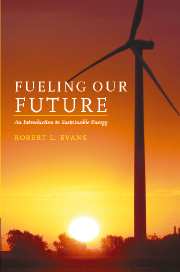Book contents
- Frontmatter
- Contents
- Preface
- Acknowledgments
- Glossary
- Part I Setting the scene
- Part II The global energy demand and supply balance
- Part III New and sustainable energy sources
- 6 Non-conventional fossil fuels
- 7 Renewable energy sources
- 8 Nuclear power
- Part IV Towards a sustainable energy balance
- Index
- References
6 - Non-conventional fossil fuels
Published online by Cambridge University Press: 05 June 2012
- Frontmatter
- Contents
- Preface
- Acknowledgments
- Glossary
- Part I Setting the scene
- Part II The global energy demand and supply balance
- Part III New and sustainable energy sources
- 6 Non-conventional fossil fuels
- 7 Renewable energy sources
- 8 Nuclear power
- Part IV Towards a sustainable energy balance
- Index
- References
Summary
NEW SOURCES OF OIL AND GAS
We have seen in the previous chapter that there will be considerable pressure on conventional fossil fuel reserves over the next few decades. Demand for oil in particular will experience substantial annual growth, and it will be difficult to maintain the recent historical reserves-to-production ratio of around 40. There is a need, therefore, to develop new or “non-conventional” sources of fossil fuels to supplement the traditional crude oil supplies. These will likely be needed until at least the end of the twenty-first century, when extensive supplies of truly renewable, or sustainable, primary energy should be available in sufficient quantities to satisfy most global energy demand. In the near-term these “new” sources of fossil fuels include the unlocking of “synthetic oil” from the extensive oil sands and oil shale deposits found in many parts of the world, and the extraction of natural gas from unused coal seams, known as “coal-bed methane.” In the longer term the use of fossil fuels in a much more environmentally benign way may be prolonged by accessing the extensive global coal supplies using so-called “clean coal” technologies, or even by accessing the extensive methane hydrate resources to be found in the deep ocean. If carbon mitigation, in the form of CO2 capture and storage, also known as “carbon sequestration,” is proven to be technically and economically viable, then we may still be using fossil fuels well into the twenty-second century.
- Type
- Chapter
- Information
- Publisher: Cambridge University PressPrint publication year: 2007



